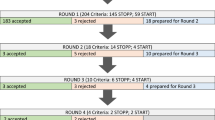Abstract
Background Drug-related problems cause suffering for patients and substantial costs. Multi-dose drug dispensing is a service in which patients receive their medication packed in bags with one unit for each dose occasion. The electronic expert support system (EES) is a clinical decision support system that provides alerts if potential drug-related problems are detected among a patients’ current prescriptions, including drug–drug interactions, therapy duplications, high doses, drug-disease interactions, drug gender warnings, and inappropriate drugs and doses for geriatric or pediatric patients. Objective The aim of the study was to explore physicians’ views on the clinical relevance of alerts provided by EES. Furthermore we investigated if physicians performed any changes in drug treatment following the alerts and if there were any differences in perceived relevance and performed changes between different types of alerts and drugs. Setting Two geriatric clinics and three primary care units in Sweden. Method Prescribed medications for patients (n = 254) with multi-dose drug dispensing were analyzed for potential drug-related problems using EES. For each alert, a physician assessed clinical relevance and indicated any intended action. A total of 15 physicians took part in the study. Changes in drug treatment following the alerts were later measured. The relationship between variables was analyzed using Chi square test. Main outcome measure Physicians’ perceived clinical relevance of each alert, and changes in drug treatment following the alerts. Results Physicians perceived 68 % (502/740) of EES alerts as clinically relevant and 11 % of all alerts were followed by a change in drug treatment. Clinical relevance and likelihood to make changes in drug treatment was related to the alert category and substances involved in the alert. Conclusion In most patients with multi-dose drug dispensing, EES detected potential drug-related problems, with the majority of the alerts regarded as clinically relevant and some followed by measurable changes in drug treatment.



Similar content being viewed by others
References
Juurlink DN, Mamdani M, Kopp A, Laupacis A, Redelmeier DA. Drug-drug interactions among elderly patients hospitalized for drug toxicity. JAMA. 2003;289(13):1652–8.
Lazarou J, Pomeranz BH, Corey PN. Incidence of adverse drug reactions in hospitalized patients: a meta-analysis of prospective studies. JAMA. 1998;279(15):1200–5.
Strandell J, Wahlin S. Pharmacodynamic and pharmacokinetic drug interactions reported to VigiBase, the WHO global individual case safety report database. Eur J Clin Pharmacol. 2011;67(6):633–41.
Jonsson AK, Spigset O, Tjaderborn M, Druid H, Hagg S. Fatal drug poisonings in a Swedish general population. BMC Clin Pharmacol. 2009;9:7.
Spinewine A, Schmader KE, Barber N, Hughes C, Lapane KL, Swine C, et al. Appropriate prescribing in elderly people: how well can it be measured and optimised? Lancet. 2007;370(9582):173–84.
Topinkova E, Baeyens JP, Michel JP, Lang PO. Evidence-based strategies for the optimization of pharmacotherapy in older people. Drugs Aging. 2012;29(6):477–94.
Rahmner PB, Eiermann B, Korkmaz S, Gustafsson LL, Gruven M, Maxwell S, et al. Physicians’ reported needs of drug information at point of care in Sweden. Br J Clin Pharmacol. 2012;73(1):115–25.
McKibbon KA, Lokker C, Handler SM, Dolovich LR, Holbrook AM, O’Reilly D, et al. The effectiveness of integrated health information technologies across the phases of medication management: a systematic review of randomized controlled trials. J Am Med Inform Assoc. 2012;19(1):22–30.
Eiermann B, Bastholm Rahmner P, Korkmaz S, Landberg C, Lilja B, Shemeikka T, et al. Knowledge bases for clinical decision support in drug prescribing—development, quality assurance, management, integration, implementation and evaluation of clinical value. In: Jao CS, editor. Decision support systems. Croatia: InTech; 2010.
Coleman JJ, van der Sijs H, Haefeli WE, Slight SP, McDowell SE, Seidling HM, et al. On the alert: future priorities for alerts in clinical decision support for computerized physician order entry identified from a European workshop. BMC Med Inform Decis Mak. 2013;13:111.
McKibbon KA, Lokker C, Handler SM, Dolovich LR, Holbrook AM, O’Reilly D, et al. Enabling medication management through health information technology (Health IT). Evid Rep Technol Assess (Full Rep). 2011;201:1–951.
Black AD, Car J, Pagliari C, Anandan C, Cresswell K, Bokun T, et al. The impact of eHealth on the quality and safety of health care: a systematic overview. PLOS Med. 2011;8(1):e1000387.
Bates DW, Cohen M, Leape LL, Overhage JM, Shabot MM, Sheridan T. White paper—reducing the frequency of errors in medicine using information technology. J Am Med Inform Assoc. 2001;8(4):299–308.
Huckvale C, Car J, Akiyama M, Jaafar S, Khoja T, Bin Khalid A, et al. Information technology for patient safety. Qual Saf Health Care. 2010;19(Suppl 2):i25–33.
Osheroff JA, Teich JM, Middleton B, Steen EB, Wright A, Detmer DE. A roadmap for national action on clinical decision support. J Am Med Inform Assoc. 2007;14(2):141–5.
Garg AX, Adhikari NK, McDonald H, Rosas-Arellano MP, Devereaux PJ, Beyene J, et al. Effects of computerized clinical decision support systems on practitioner performance and patient outcomes: a systematic review. JAMA. 2005;293(10):1223–38.
Kuperman GJ, Bobb A, Payne TH, Avery AJ, Gandhi TK, Burns G, et al. Medication-related clinical decision support in computerized provider order entry systems: a review. J Am Med Inform Assoc. 2007;14(1):29–40.
Robertson J, Walkom E, Pearson SA, Hains I, Williamsone M, Newby D. The impact of pharmacy computerised clinical decision support on prescribing, clinical and patient outcomes: a systematic review of the literature. Int J Pharm Pract. 2010;18(2):69–87.
Hemens BJ, Holbrook A, Tonkin M, Mackay JA, Weise-Kelly L, Navarro T, et al. Computerized clinical decision support systems for drug prescribing and management: a decision-maker-researcher partnership systematic review. Implement Sci. 2011;6:89.
Jaspers MW, Smeulers M, Vermeulen H, Peute LW. Effects of clinical decision-support systems on practitioner performance and patient outcomes: a synthesis of high-quality systematic review findings. J Am Med Inform Assoc. 2011;18(3):327–34.
Seidling HM, Schmitt SP, Bruckner T, Kaltschmidt J, Pruszydlo MG, Senger C, et al. Patient-specific electronic decision support reduces prescription of excessive doses. Qual Saf Health Care. 2010;19(5):e15.
Scott GP, Shah P, Wyatt JC, Makubate B, Cross FW. Making electronic prescribing alerts more effective: scenario-based experimental study in junior doctors. J Am Med Inform Assoc. 2011;18(6):789–98.
Mollon B, Chong J Jr, Holbrook AM, Sung M, Thabane L, Foster G. Features predicting the success of computerized decision support for prescribing: a systematic review of randomized controlled trials. BMC Med Inform Decis Mak. 2009;9:11.
Horsky J, Phansalkar S, Desai A, Bell D, Middleton B. Design of decision support interventions for medication prescribing. Int J Med Inform. 2013;82(6):492–503.
Riedmann D, Jung M, Hackl WO, Ammenwerth E. How to improve the delivery of medication alerts within computerized physician order entry systems: an international Delphi study. J Am Med Inform Assoc. 2011;18(6):760–6.
Nanji KC, Slight SP, Seger DL, Cho I, Fiskio JM, Redden LM, et al. Overrides of medication-related clinical decision support alerts in outpatients. J Am Med Inform Assoc. 2014;21(3):487–91.
Slight SP, Nanji KC, Seger DL, Cho I, Volk LA, Bates DW. Overrides of clinical decision support alerts in primary care clinics. Stud Health Technol Inform. 2013;192:923.
Hammar T, Hovstadius B, Lidström B, Petersson G, Eiermann B. Potential drug related problems detected by electronic expert support system in patients with multi-dose drug dispensing. Int J Clin Pharm. 2014;36(5):943–52.
Ucar A. Assessment of clinical relevance of alerts from EES used at an emergency department. Uppsala University: Department of pharmaceutical bioscience, 2011 [In Swedish].
Johnell K, Fastbom J. Multi-dose drug dispensing and inappropriate drug use: a nationwide register-based study of over 700000 elderly. Scand J Prim Health Care. 2008;26(2):86–91.
Sjoberg C, Edward C, Fastbom J, Johnell K, Landahl S, Narbro K, et al. Association between multi-dose drug dispensing and quality of drug treatment—a register-based study. PLoS One. 2011;6(10):e26574.
Wallerstedt SM, Fastbom J, Johnell K, Sjoberg C, Landahl S, Sundstrom A. Drug treatment in older people before and after the transition to a multi-dose drug dispensing system—a longitudinal analysis. PLoS One. 2013;8(6):e67088.
Sinnemaki J, Sihvo S, Isojarvi J, Blom M, Airaksinen M, Mantyla A. Automated dose dispensing service for primary healthcare patients: a systematic review. Syst Rev. 2013;2:1.
Johnell K, Klarin I. The relationship between number of drugs and potential drug-drug interactions in the elderly: a study of over 600,000 elderly patients from the Swedish Prescribed Drug Register. Drug Saf. 2007;30(10):911–8.
Olsson J, Bergman A, Carlsten A, Oke T, Bernsten C, Schmidt IK, et al. Quality of drug prescribing in elderly people in nursing homes and special care units for dementia: a cross-sectional computerized pharmacy register analysis. Clin Drug Investig. 2010;30(5):289–300.
Ruggiero C, Lattanzio F, Dell’Aquila G, Gasperini B, Cherubini A. Inappropriate drug prescriptions among older nursing home residents: the Italian perspective. Drugs Aging. 2009;26(Suppl 1):15–30.
Lao CK, Ho SC, Chan KK, Tou CF, Tong HH, Chan A. Potentially inappropriate prescribing and drug-drug interactions among elderly Chinese nursing home residents in Macao. Int J Clin Pharm. 2013;35(5):805–12.
Wahab MS, Nyfort-Hansen K, Kowalski SR. Inappropriate prescribing in hospitalised Australian elderly as determined by the STOPP criteria. Int J Clin Pharm. 2012;34(6):855–62.
Jani YH, Barber N, Wong IC. Characteristics of clinical decision support alert overrides in an electronic prescribing system at a tertiary care paediatric hospital. Int J Pharm Pract. 2011;19(5):363–6.
van der Sijs H, Aarts J, Vulto A, Berg M. Overriding of drug safety alerts in computerized physician order entry. J Am Med Inform Assoc. 2006;13(2):138–47.
van der Sijs H, Mulder A, van Gelder T, Aarts J, Berg M, Vulto A. Drug safety alert generation and overriding in a large Dutch university medical centre. Pharmacoepidemiol Drug Saf. 2009;18(10):941–7.
Phansalkar S, Desai A, Choksi A, Yoshida E, Doole J, Czochanski M, et al. Criteria for assessing high-priority drug-drug interactions for clinical decision support in electronic health records. BMC Med Inform Decis Mak. 2013;13(1):65.
Seidling HM, Klein U, Schaier M, Czock D, Theile D, Pruszydlo MG, et al. What, if all alerts were specific—estimating the potential impact on drug interaction alert burden. Int J Med Inform. 2014;83(4):285–91.
Duke JD, Li X, Dexter P. Adherence to drug-drug interaction alerts in high-risk patients: a trial of context-enhanced alerting. J Am Med Inform Assoc. 2013;20(3):494–8.
Bryant AD, Fletcher GS, Payne TH. Drug interaction alert override rates in the Meaningful Use era: no evidence of progress. Appl Clin Inform. 2014;5(3):802–13.
Slight SP, Seger DL, Nanji KC, Cho I, Maniam N, Dykes PC, et al. Are we heeding the warning signs? Examining providers’ overrides of computerized drug-drug interaction alerts in primary care. PLoS One. 2013;8(12):e85071.
McCoy AB, Thomas EJ, Krousel-Wood M, Sittig DF. Clinical decision support alert appropriateness: a review and proposal for improvement. Ochsner J. 2014;14(2):195–202.
Acknowledgments
The authors would like to express their gratitude to Abdul Aziz Ali for advice on statistical analyses. The authors would also like to thank Ramtin Atifeh and the participating health care units.
Funding
The study was financed by the eHealth Agency, the Medical Products Agency, and the Linnaeus University, Sweden.
Conflicts of interest
None.
Author information
Authors and Affiliations
Corresponding author
Rights and permissions
About this article
Cite this article
Hammar, T., Lidström, B., Petersson, G. et al. Potential drug-related problems detected by electronic expert support system: physicians’ views on clinical relevance. Int J Clin Pharm 37, 941–948 (2015). https://doi.org/10.1007/s11096-015-0146-8
Received:
Accepted:
Published:
Issue Date:
DOI: https://doi.org/10.1007/s11096-015-0146-8




